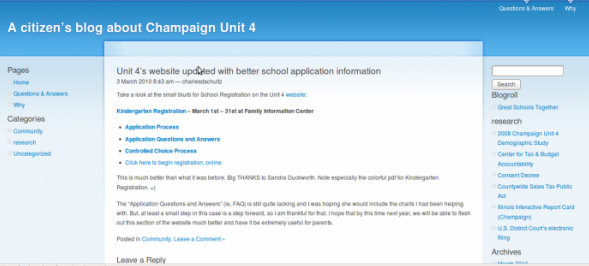
Regardless of your political orientation, whether you have children or not, the state of the local school district is an exceedingly important part of any community. And for a city the size of Champaign, the school system’s operations can be complex enough to befuddle most unschooled observers. That’s where Charles Schultz comes in.
Schultz, author of the outstanding website A citizen’s blog about Champaign Unit 4, wasn’t always interested in the machinations of his local school district. “I was happy to live my life, and I didn’t really care too much [about how Unit 4 worked],” Schultz said. “I didn’t read the newspapers, I voted no on all the tax increases out of principle, out of hand, and I wasn’t even aware that there was a bigger picture going on.”
However, that apathy had an expiration date. His point of entry into local school issues was when he started looking into the Consent Decree. “That’s when I learned about John Lee Johnson, and I learned about all the racial inequities that are happening in Champaign,” Schultz explained. “Especially with bussing and how the schools are deteriorating physically but also [how] they’re having a problem getting good teachers and good staff in the quote-unquote inner-city schools.”
Schultz, who works in database management for the University of Illinois, started his Unit 4 blog in November 2008 in order to, as he put it, “get it down to share with other people in case they had the same kind of questions or were going down the same path.”
Much of the impetus for the blog came from Schultz’ dissatisfaction with local media coverage of school issues. “I was really shocked to learn that the media is not really reporting on the issues that much [when I first started the blog],” he said. “There’s a lot of opinions that are stirred up, especially between the black community and the white community, and especially concerning their lawyers from Chicago. The media doesn’t really point out what the core issues are.”
His background in databases helps him avoid the rhetoric and zero in on those core issues. Schultz continued, “When I post the charts with the demographic information [such as in this post], I’m trying to get to the numbers. I’m trying to strip away the subjectivity people have and get to the objectivity. What’s really the state of where Unit 4’s at?” Another great example of Schultz’ work in this area was his breakdown of Kindergarten lottery data, which revealed much about which schools are most and least selected by parents.
When pressed on what the issues are that face Unit 4, Schultz offers, “There are some members of the community that just want to ignore the issues. From that segment of the community, there’s no real ownership, especially when it comes to taking care of poor children, whether they be Latino, black, or white.”
“Part of the other issue is that there are a lot of people who have good intents, and they’re just not getting a lot of support for those good intents, so they just sort of fall by the wayside. People like [Unit 4 Superintendent] Arthur Culver, he’s trying hard to do some good things, and some of them turn out well, and some of them don’t, and people I think focus on the negative aspects of what he’s doing, and I don’t think there’s enough acknowledgement of the good work he’s doing.”
Schultz finds that much of the complex terminology used by education professionals can be off-putting for parents. “We’ve had a thing called Controlled Choice that is very confusing for parents, especially when I started to learn about this stuff,” he noted. “I think the media and Unit 4 administration have not really done a great service to the community by not describing what these things actually are. They use this jargon and they assume that people will figure out what they are, but it’s very confusing when you’re first getting into it.”
The obfuscation is not intentional, in Schultz’ point of view. “I’ve talked to Dr. Michael Alves, who’s done a tremendous amount of work building up the Controlled Choice program on a national level, and I think just because he’s a researcher, he’s a professor, he talks in that kind of language, that jargon. Those are the words that he uses. He just doesn’t think about it coming from a layman’s point of view. At the Family Information Center, and they’re trying to make it more palatable, using more common language.”
Schultz explains his understanding of Unit 4’s financial outlook: “As you probably know, the community passed a one percent sales tax recently, and that will all go into the infrastructure bucket, so that bucket is looking pretty good. They will be able to pull out of that bucket and improve schools, schools that really need improvement. They’re working on Booker T. Washington, they’re working on Garden Hills, and they’re putting a school out here in Savoy. So these are needs they’ve had identified for a while. They did two demographic studies to target those needs. The other part of the picture is with staff funding and program funding, and that bucket is really, really empty, and it’s looking really bad.”
Despite that, Schultz, who lives in Savoy, says that after all his research, he wants to send his child to Unit 4 schools. “I’ve been to the schools and visited teachers, we have friends who are teachers. I’m very comfortable sending my child to Unit 4,” he said. And that’s certainly an endorsement that grew out of a great deal of thought.
——
If you enjoyed this article, Smile Politely also recommends:








